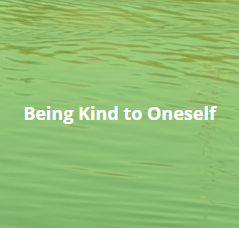
Giving the gift of kindness to oneself is a true gift of self. Sometimes we can forget that the individual can be an object of her or his own experience. This is akin to counting the number of people in a room and forgetting to include oneself in the count.
Treating oneself with the highest degree of respect that one affords a best friend speaks to the importance of considering oneself as one’s own best friend. The way we treat ourselves is often a good way to measure how we will and do treat others.
Kindness is a gift that benefits the receiver and the giver. Kindness is not self-indulgence. When an individual is self-indulgent, he or she cannot resist the gratification of whims and desires. Just because something “feels” good, it doesn’t necessarily mean that it is good. Self-indulgence means that either the receiver or the giver is not getting full benefit from the act.
In the words of psychotherapist Claudia H. Christian, “self-kindness is applying a generous and warm heart toward yourself to create sympathy and understanding from yourself, for yourself.”
In the same way that we can be kind in our consideration of other people, we can also be kind to ourselves.
Genuine self-kindness originates in self-esteem that is based on the positive and negative beliefs one has about being valuable or capable. I can say to myself, “I am worthy enough for me to be kind to myself.” However, if these notions of self-worth are not enriched by healthy self-respect, then kindness to oneself can morph into self-indulgence. Self-respect leads us to say for example, “I don’t really need to have that third piece of delicious cake.”
A review of the of the Spectrum of Kindness shows that there can be situations when we are aware of the need to be kind to ourselves, and then refuse to heed that awareness.
Sometimes we can be kind to ourselves without appreciating the full awareness of our own power to be self-kind.
When we are asked to reflect and realize that we can be more kind to ourselves, this is kindness resulting from our being asked to give (kindness to ourselves.) Sometimes we can reluctantly oblige.
Being genuinely kind to oneself does not stem from an expectation of a return. That return can be in terms of being more balanced, calmer, more at peace with oneself. If we try to achieve more balance, calmness, and peace through being kind to ourselves, then what happens if we do not find the balance, calm and tranquility that we desire? We lose hope and unfortunately can dismiss the inherent benefit in self-kindness. What is this benefit? Simply stated, Love.
At other times, we can be kind to ourselves out of guilt. I have heard people, and myself, say “I should be more kind to myself. Kindness is a set of awarenesses, thoughts, feelings and actions that benefits the receiver and the giver. Feeling that one has to be kind to oneself does not open up the well-spring of generosity of spirit inherent in all humans.
Sometimes we can be kind to ourselves without expecting a return. This is where we can find the true difference between self-indulgence and being kind to oneself.
When we are proactively self-kind, we realize that, for example, a certain habit and behavior is self-destructive, and we choose to be kind to ourselves in gradually changing the habit or behavior.
This section on being kind to oneself ends this section on Kindness. We looked at witnessing, receiving, and giving kindness in our relations with others and ourselves.
Download this text as a PDF document.
I experienced being kind towards myself.
Jot down a few notes about your experience:
What were you doing?
What were you thinking about?
What were you feeling?
What were you aware of?
Click here to download this Memory Sheet in PDF format.